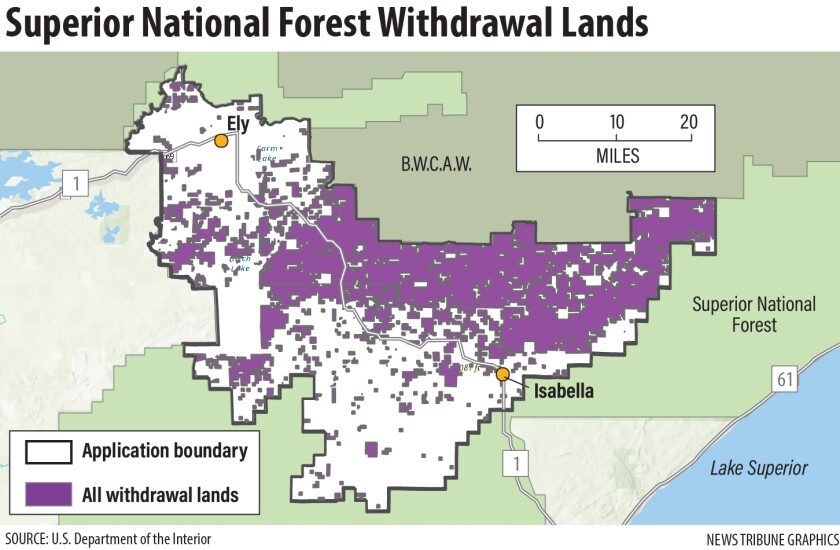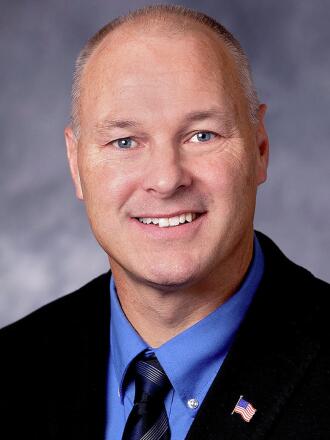DULUTH — The Biden administration will ban new mining on federal land within the same watershed as the Boundary Waters Canoe Area Wilderness for the next 20 years.
Secretary of the Interior Deb Haaland signed a public land order Thursday preventing new mineral leases on 225,500 acres of the Superior National Forest in Northeastern Minnesota. Mining is already banned in the BWCAW, but there has long been concern that copper-nickel mines, if built in the Rainy River Watershed surrounding the wilderness area, would send toxic runoff into the downstream BWCAW.

The move comes after the Forest Service released a study in June that said hardrock mining within the watershed would pose an environmental risk to the BWCAW.
“The Department of the Interior takes seriously our obligations to steward public lands and waters on behalf of all Americans. Protecting a place like Boundary Waters is key to supporting the health of the watershed and its surrounding wildlife, upholding our Tribal trust and treaty responsibilities, and boosting the local recreation economy,” Haaland said in a news release Thursday. “With an eye toward protecting this special place for future generations, I have made this decision using the best-available science and extensive public input.”
It was welcome news for many environmental groups.
ADVERTISEMENT
"You don't allow America's most toxic industry next to America’s most popular wilderness," said Becky Rom, national chair of the Campaign to Save the Boundary Waters. "The Boundary Waters is a paradise of woods and water. It is an ecological marvel, a world-class outdoor destination, and an economic engine for hundreds of businesses and many thousands of people."
But it angered pro-mining advocates, who say the industry would bring much-needed jobs to the region, could be done safely and want the projects to be reviewed individually rather than rejected through a blanket ban on mining.

“This action begs the question: Why doesn’t the government have confidence in its own agencies’ ability to review proposed specific projects?” said David Chura, chair of Jobs for Minnesotans, a coalition that advocates for projects like Twin Metals.
The Biden administration has long signaled its intention to restrict mining within the Rainy River Watershed, returning to Obama-era restrictions that effectively killed the proposed Twin Metals copper-nickel mine but were subsequently reversed by the Trump administration.
Agriculture Secretary Tom Vilsack, who also served in that role in the Obama administration when it made the same mineral lease rejections and mineral withdrawal decisions in 2016, praised Haaland's decision, saying it will "protect the long-term health of the Rainy River Watershed, including the irreplaceable Boundary Waters Canoe Area Wilderness.”
“This landscape is an international resource renowned for its multitude of recreational opportunities and provides millions of visitors with unparalleled wilderness experiences,” Vilsack said in the news release.
The U.S. Interior and Agriculture departments in October 2021 announced they would not allow new federal mineral leases within 225,500 acres of the Rainy River Watershed, which is shared with the BWCAW for two years with the possibility of extending it to a 20-year withdrawal .
The next day, the Interior's Bureau of Land Management said it would deny an application for a third federal mineral lease and a batch of prospecting permits for Twin Metals, which has been trying to open an underground copper-nickel mine, processing plant and dry-stacked tailings storage facility on the edge of Birch Lake, which flows into the Kawishiwi River and then the BWCAW.
ADVERTISEMENT


Thursday's decision further scuttles Twin Metals' plans.
But the company, a subsidiary of Chilean mining giant Antofagasta, sued the Biden administration in August in an attempt to regain its mineral leases canceled by the administration earlier that year.
The mineral withdrawal will not affect "valid existing rights" within the area and the move will not impact existing iron ore mines.
Asked about what would happen if the company's lawsuit was successful and it won its mineral leases back, an Interior Department official declined to comment on ongoing litigation, saying only that there was no pending application for leases or a mine plant of operation in the withdrawal area. The official noted the Bureau of Land Management had already rejected the company's proposed mine plan of operation for underground mining operations.
In a statement Thursday afternoon, Twin Metals said it was "deeply disappointed and stunned" by the withdrawal.
"This region sits on top of one of the world’s largest deposits of critical minerals that are vital in meeting our nation’s goals to transition to a clean energy future, to create American jobs, to strengthen our national security and to bolster domestic supply chains," the company said. "We believe our project plays a critical role in addressing all of these priorities, and we remain committed to enforcing Twin Metals’ rights."
U.S. Rep. Pete Stauber, R-Minn., and other pro-mining advocates have said Biden is hypocritical for signaling he would support mining minerals needed for electric vehicles and critical minerals domestically but also signing deals to source those minerals and actively seeking to delay domestic projects like Twin Metals.
With Republicans in control of the U.S. House, Stauber, a Hermantown resident who represents the 8th Congressional District, is chair of the Natural Resources Energy and Mineral Resources Subcommittee.
ADVERTISEMENT

In December, Stauber told Fox News that his subcommittee will investigate the Biden administration's mining policies.
"We are not only going to legislate, but we're going to have oversight," Stauber told Fox News. "We want to know why this administration continues to not allow mining in the United States. We want to know why they've pulled federal permits without allowing an environmental impact statement to move forward."
He doubled down in a statement Thursday.
"I can assure you that this administration, from the president to the Forest Service, to the Interior Department, will answer for the pain they elected to cause my constituents today," Stauber said.
An Interior Department official on Thursday noted the Biden administration is spending billions to establish a critical mineral supply chain, but said it should not come at the expense of the environment. The BWCAW is "irreplaceable," the official said.
"Both the president and the secretary have been clear that this administration supports responsible mining to develop critical minerals where those projects don't pose unacceptable impacts to communities or the environment," the official said.
This story was updated at 3:45 p.m. Jan. 26 with additional quotes and reaction. It was originally posted at 1 p.m. Jan. 26.
















